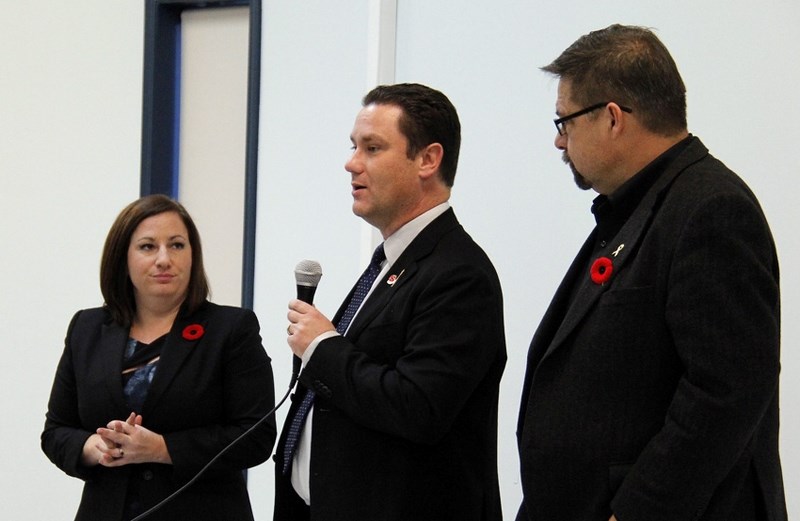Robert Christians is a small business owner within the Lakeland, and his story is one that touched the hearts of many.
Christians said, should the proposed federal carbon tax be implemented, it is not only his business that will suffer, but also his family.
On Thursday, Nov. 10, Christians, among other residents, met with local officials at a carbon tax meeting hosted at the Bonnyville Seniors Drop-In Centre to discuss their concerns about the proposed carbon levy.
Fargo Ventures is a small trucking company based out of Bonnyville, which has been owned and operated by Christians for the past five years. The company offers gravel hauling and mobile mechanic services.
“This carbon tax will bankrupt us,” Christians stated. “No questions asked.”
Currently, Christians spends anywhere from $25,000 to $40,000 per month on fuel.
“When you take (about) ten per cent on top of my fuel costs… that's my profit, and all of my profit, so there's nothing left,” he said, adding what would have been left would have been used to cover everyday costs, and sports activities for his kids.
Should the federal carbon tax be implemented, it would not include the provincial tax coming into play Jan. 1, 2017, known as Bill 20. The bill was introduced as part of Alberta's Climate Change Leadership Plan, and will cost Albertans $20 per tonne of CO2 in 2017, rising to $30 per tonne for 2018.
This translates into approximately $338 in carbon levy costs for a family of four for 2017, increasing to $508 in 2018. Six out of 10 Albertans will receive a rebate to help offset the cost of the levy, which for a family of four, could amount to a rebate total of $360.
The proposed federal carbon levy could cost families an additional $50 per tonne by 2022, starting at $10 per tonne in 2018.
Christians' presently employs four people full-time through Fargo Ventures, and said should the tax be executed federally; he would have to make some cuts, leaving four men out of work.
He also works as a mechanic locally, and would be required to move his business elsewhere in order to make ends meet due to the lack of work available in the area.
“I won't be able to support myself or my family, so I won't be able to continue to live in Bonnyville, and we may have to move away,” he said.
Bonnyville-Cold Lake MLA Scott Cyr, Lakeland MP Shannon Stubbs and Fort McMurray-Cold Lake MP David Yurdiga hosted the meeting as a way of informing the public about the federal and provincial carbon taxes, and what it could mean for their community.
“I learned a lot today about where they are going to go with it. There's really no option or way to get around it from a provincial stand-point, federally we may be able to change things, but at least provincially it looks like we are status quo and (Premier Rachel Notley) is going to implement it (Bill 20) as of January 1,” Christians exclaimed.
The purpose for both the federal and provincial taxes is to help reduce Canada's overall gas emissions. Federally, the revenues from the tax will be returned to the jurisdiction of origin, while provincially, the funds are rebated to lower-income consumers.
During the question and answer portion of the meeting, residents asked who would be exempt from paying the tax.
Local officials said they had yet to hear of anyone officially being labeled as exempt from the provincial carbon tav, however exemptions have been listed to include biofuels, inter-jurisdictional flights, fuel sold for export, purchases of fuel on-reserve by eligible First Nations individuals and bans for personal and band use, and marked gasoline and diesel used by farmers in farming operations.
Cyr said because Bonnyville is located in northern Alberta, and generally suffers from colder temperatures, it is more likely to be affected by the carbon tax than those that live in warmer areas of the country.
“They are going to have less costs there, for us, this is going to have a big impact,” he said.



